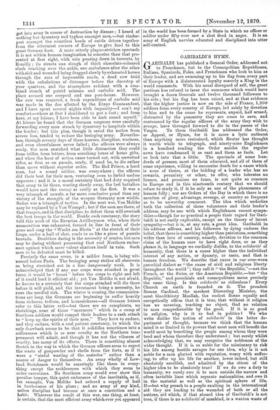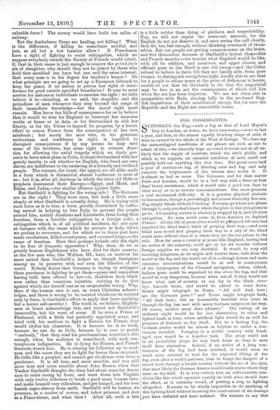GARIBALDI'S HYMN.
GARIBALDI has published a General Order, addressed not to Frenchmen, but to the Cosmopolitan Republicans, Italians, Spaniards, Poles, and Frenchmen who look to him as
their leader, and are swarming up to his flag from every part of Europe with a disinterested loyalty scarcely a King in the world commands. With his usual disregard of self, the great partizan has refused to issue the summons which would have brought a dozen Generals and twelve thousand followers to his side ; but his flag has been raised, and at that evidence that the higher justice is now on the side of France, 1,200 soldiers from every country of Europe, led solely by devotion to him and to the cause he represents, unpaid, half armed, distrusted by the peasantry they are come to save, and contemned by the regular officers of the army they wish to avenge, have thronged forward to die in the passes of the Vosges. To them Garibaldi has addressed the Order, or Appeal, or Hymn, for it is more a lyric outburst than anything more restrained, which Reuter has thought
it worth while to telegraph, and ninety-nine Englishmen in a hundred reading the Order amidst the regular news have condemned it as rant and them as fools. Let us look into that a little. The spectacle of some hun- dreds of persons, most of them educated, and all of them of some experience, willing to encounter death for a cause which is none of theirs, at the bidding of a leader who has no rewards, pecuniary or other, to offer, who tolerates no licence, and promises no fame, is not quite so common in Europe and in this nineteenth century that we should refuse to study it, if it be only as one of the phenomena of human folly ; nor are Orders of the Day in which there is no mention of glory, advantage, revenge, or country so frequent as to be unworthy comment. The idea which underlies both the collection of these volunteers and their leader's address, may be one with which Englishmen cannot sympa- thize—though for so practical a people their regard for Gari- baldi is not easily explicable, except on the theory of latent sympathy—but it is, at any rate, a great idea. Garibaldi in his address affirms, and his followers by dying endorse the belief, that there is something higher than patriotism, something wider than love of country, namely, devotion to the common claim of the human race to have right done, or as they phrase it, in language we cordially dislike, to the solidarite' of humanity, that there is a cause higher than the individual interest of any nation, or dynasty, or caste, and that is human freedom. We describe that cause in our over-worn parochial dialect as "the cause of civil and religious liberty throughout the world "; they call it "the Republic,"—not the French, or the Swiss, or the American Republic,—but "the Republic," and parochials and cosmopolitans mean precisely the same thing. Is this solidarite' so ridiculous ? Every Church on earth is founded on it. The proudest Roman Cardinal, the meekest Dissenting Minister, the most bloodthirsty Moollah, the coolest Bonze equally and energetically affirm that it is true, that without it religion has no meaning, teaching no object, God no relation to man comprehensible by the good. If it is BO good in religion, why is it so bad in politics ? We who write dislike the notion of solidarite' in the latter de- partment of thought, because we think that the human mind is so limited in its powers that most men will benefit the world most by benefiting the people among whom they were bred and whom therefore they understand ; but surely whilst acknowledging that, we may recognize the nobleness of the wider thought. If it is so noble for the missionary to risk his life among hostile savages for one idea, why is it not noble for a man glutted with reputation, weary with suffer- ing, to offer up his life for another, lower indeed, but still absolutely unselfish, and admitted by the de'vots of the higher idea to be absolutely true? If we do owe a duty to humanity, we surely owe it to men outside the narrow and often invisible lines which separate nationalities, and owe it in the material as well as the spiritual sphere of life. If—but why preach to a people exulting in the international aid they are lending to the wounded of both or all the nations, aid which, if that absurd idea of Garibaldi's is not true, if there is no solidarite' of mankind, is a wanton waste of
valuable force The money would have built ten miles of railway.
But the Ambulance Corps are healing, not killing What is the difference, if killing be sometimes needful and just, as all but a few fanatics allow ? If Frenchmen have a right of fighting to resist subjugation, which we suppose everybody outside the Society of Friends would admit, if, that is, their cause is just enough to remove the prima facie sin of slaughter, why should they not be joined by those who hold that mankind can have but one and the same interest, that every man is in his degree his brother's keeper ? On what principle are we going to set up a European tribunal to keep the peace, if no nation or person has right of inter- ference for good outside specified boundaries ? It may be most unwise for nations or individuals to exercise the right ; we fully believe it is—dreading, as we said, the stupidity and the prejudices of men whenever they step beyond the range of their immediate knowledge—but the moral right must remain. Men know too little of consequences for us to believe that it would be wise for England to interrupt her immense works at home or in Asia, or for Switzerland to risk her liberty, or for the Union to imperil its progress, by a heroic effort to rescue France from the consequences of her own misdeeds ; but surely the man who, in his generous enthusiasm and confidence in right, is impelled to disregard consequences if by any means he may save some of his brethren, has some right to censure Ame- rica for allowing the awful tragedy which we dimly per- ceive to have taken place in Cuba, to taunt Switzerland with her greedy inertia, to ask whether we English, who freed our own slaves, are indifferent to the enslaving of a friendly and civilized people. The censure, the taunt, the appeal, are all alike made in a form which is distasteful, almost loathsome, to most of us ; but it is, after all, the form in which the stern old Hebrew prophets denounced their Europe,—Egypt, and Moab, and Edom, and Judea,—for similar offences against light.
But Garibaldi is fighting for the wrong side ? The Germans are in the right ? They were once, but look a little more closely at what Garibaldi is actually doing. He is trying with such force as is in him, a force greatly diminished by suffer- ing earned in helping to free Italy, to prevent the people around him, mainly Alsatians and Lorrainers, from losing their freedom, from a forcible subjugation to a foreign yoke, a subjugation which is, of all political incidents, the one most at variance with the cause which he accepts as holy, which we profess to reverence, and for which we in times past have made revolutions, killed countrymen, and executed kings,--the cause of freedom. Does that perhaps include only the right to be free of domestic oppression? Why, then, do we so greatly honour Englishmen who have died for their country, or the few men who, like William III., have, on motives far more mixed than Garibaldi's, helped us, though foreigners among us, to preserve with our own the liberties of the world. Nobody denies that Germany is trying to subjugate these provinces, is fighting to get them—peace and reparation having both been offered to her—is, doubtless from blind- ness rather than conscious injustice, striving to do that against which she herself rose as an unspeakable wrong. Why, then, if the human race is one, as every Christian acknow- ledges, and there is wrong to be resisted which can be resisted only by force, is Garibaldi's effort to apply that force anything but a heroic self-sacrifice ? The truth is, we believe, English- men at heart acknowledge this, and resent not Garibaldi's immorality, but his want of sense. If he were a Prince of Piedmont, with a little but perfectly appointed army, and tried with his motives to fight a Novara for France, they would idolize his character. It is because he is so weak, because he can do so little, because he is sure to perish "uselessly," that they read his proclamations, sometimes able enough, when his audience is considered, with such con- temptuous indignation. He is dying for France, and French Generals desert him. He is stirring his followers up to mad- ness, and the cause they are to fight for leaves them unarmed. He talks like a prophet, and cannot get obedience even from a gendarme. It is all true, and most sensible, and was still more true and more sensible about John Brown, when that Yankee Garibaldi thought the time had about come for decent men to resist wrong by force, and went down into Virginia with only twelve followers to break a good many human laws, and make himself very ridiculous, and get hanged, and for ever banish negro slavery from earth. Garibaldi will be beaten, we presume, as a matter of course, and taken prisoner, and shot
as a Franc-tireur, and what then After all, such a fate
is a little nobler than dying of plethora and respectability. Nay, we will not repeat the worn-out sarcasm, for the English do not yet deserve it, and once seeing the call clearly, they die, too, fast enough, without thinking overmuch of them- selves. But our people are getting common-sense on the brain, and fret themselves because of Garibaldi's lyrical rhapsodies and French anarchy—we wonder what England would be like, with all its soldiers, and members, and upper classes, and officials gone to the Devil in one fell swoop—and the Celtic refusal to believe in facts, till they are hardly able, from pure temper, to distinguish wrong from right, hardly able to see that for a people to refuse peace at the price of dishonour is heroic, unable to see that for Garibaldi to die that the ungrateful may be free is an act the consequences of which will live when the act has been forgotten. We are not often able to sympathize with Reds, sharing fully in the profound Eng- lish impatience of their misdirected energy, but for once the Republic and the Right are convertible terms. •



































 Previous page
Previous page